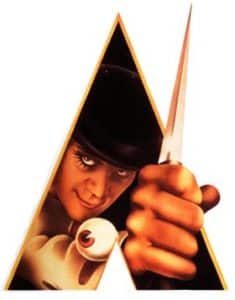The representation of A Clockwork Orange as a whole both supports Burgess’ acclaims to original sin and presents a case in which the government intervenes with spiritual purification and consequently shifts, becoming tyrannical. Alex is at the center of this representation and he provides well to support Burgess’ view on this subject as presented in the interview.
Burgess believes in original sin, and denies the strive for perfection on earth, which he explains is a futile attempt and even more vain when governments try to force heavenly perfection artificially.
The government in Alex’s time represents the government Burgess addresses in the interview, Russia and Nazi Germany. Alex’s government does in fact try to intervene with his own moral perfection, which consequently proves to be an unsuccessful attempt.
Ludovico’s procedure in A Clockwork Orange is a procedure of moral correction; associating specific acts of vandalism with a sickness, which physically prevents the patient to perform such acts.
Now physically they may not be able to be imperfect, but if there is still a moral choice to perform these acts, as there clearly was in Alex’s case for he tried to hit Joe when the time came round and he as well tried to grab the naked women during his testing, than any world beyond the material world would not see this as a correction at all.
In fact, nothing has really changed within the patient. Burgess says that it is rightly impossible for a human being to be morally transformed by anyone saves himself, and the closest any artificial variable, such as the government’s procedure, will come to would be on a physical level that just builds a wall between the patient’s criminal tendencies and society.
This first point expresses the vain attempt of governmental correction, but Burgess further exploits this detail by expressing the failure for the procedure to even succeed on a physical level, for Alex wound up jumping out of a window and later being conditioned to return to his old vicious self.
Alex does not truly become conditioned towards the general good structure of a human being until he personally decides to throw down his rebellious signature and grow up. What is ironic about this is the simplicity of it all when millions of dollars and countless hours of research were spent on correcting this youth unsuccessfully and in a day’s time, with such a little effort spent, he is on the road to correction.
This is Burgess’ influence on the book when he says that we must sort out morality for ourselves without the intervention of an intrusive government. These wacky governmental figures attempt to perfect this fallible world and in consequence, only exacerbate the situation. Consider Alex, Dim, and Pete who consciously cured what society had tried very hard to condition.
Pete became married, Dim, hired as a Millicent, and Alex simply felt one day that he was growing up and too old for vandalism anymore. What these boys performed was all based on free will, despite the undying efforts of figures such as Mr. Deltoid and Dr. Brodsky.
As apparent in A Clockwork Orange, man cannot support heaven on earth, and man does not have the ability to create a just society, which was clearly represented in the gross mistake of Ludovico’s procedure to artificially contrast this theme.


Alex did wrong and was given that treatment that I personally think was not only controversial but the same as used by the thought police to control others and take away the freedom of thought and action. At the time the film was released the violence was shocking but nowadays would be classified as mild as times and people have changed.